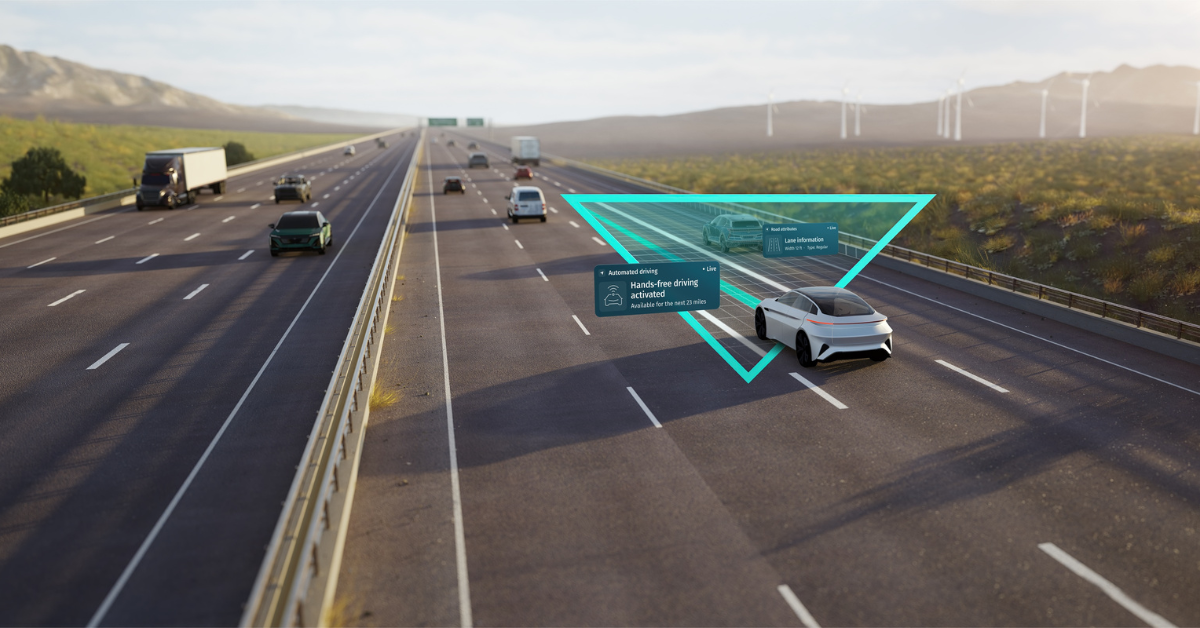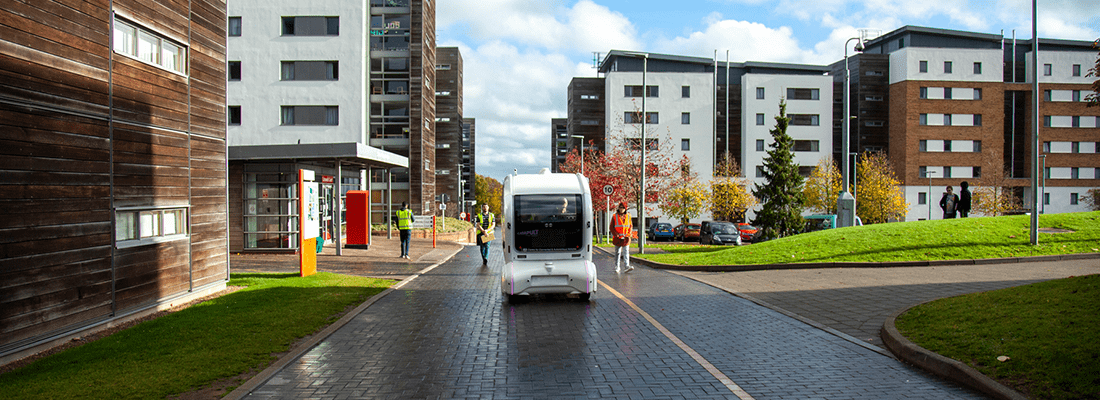The introduction of self-driving cars could have a major impact on how older adults go about their daily lives. It is hoped these cars will help reduce the social isolation and loneliness we often experience as we get older.
Additionally, this technology has the potential to enable a greater level of independence for disabled people, both those with visible disabilities (such as mobility, visual, or hearing impairments) and those with non-visible disabilities (such as mental, learning, or memory impairments). This is particularly important for older people, as 44% of State Pension age adults reported a disability in 17/18. Connected and automated vehicles, also known as CAVs, are vehicles that in the future could perform many of the functions of today’s human drivers. This might be difficult to imagine, however, connectivity and driver-assistance features are already common in cars.
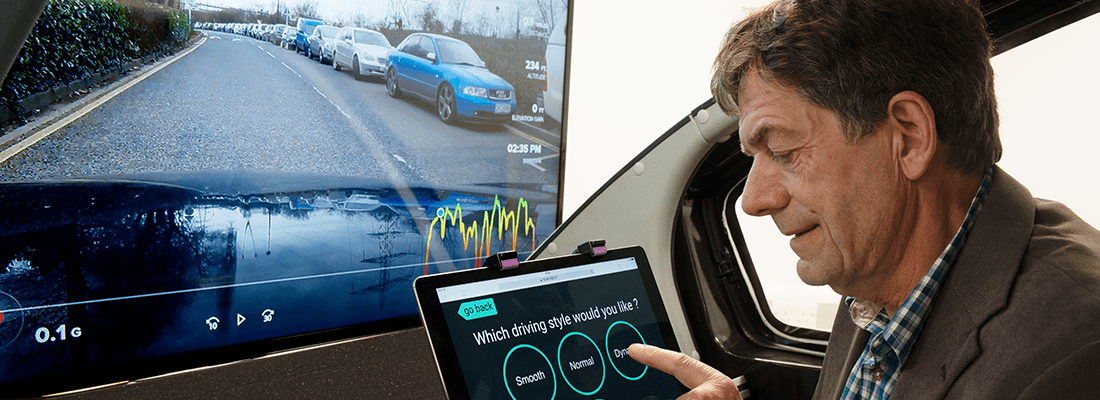
Today, vehicles can connect to the internet to provide drivers with information on road, traffic and weather conditions. They can also take over limited parts of the driving task, for example using advanced emergency braking to help avoid collisions and adaptive cruise control to increase fuel efficiency and reduce driver fatigue.
The UK is already a world leader in developing connected and automated vehicle technology, thanks to the country’s world class research base and clear rules for safe and responsible testing. Aware of the potential benefits of the technology - from improving road safety and reducing traffic congestion, to enabling greater travel independence - the Government has been playing an active role in encouraging the technology.
Indeed, it has committed to spending over £200million on research and development and testing infrastructure to accelerate the delivery of safe and secure automated vehicles.
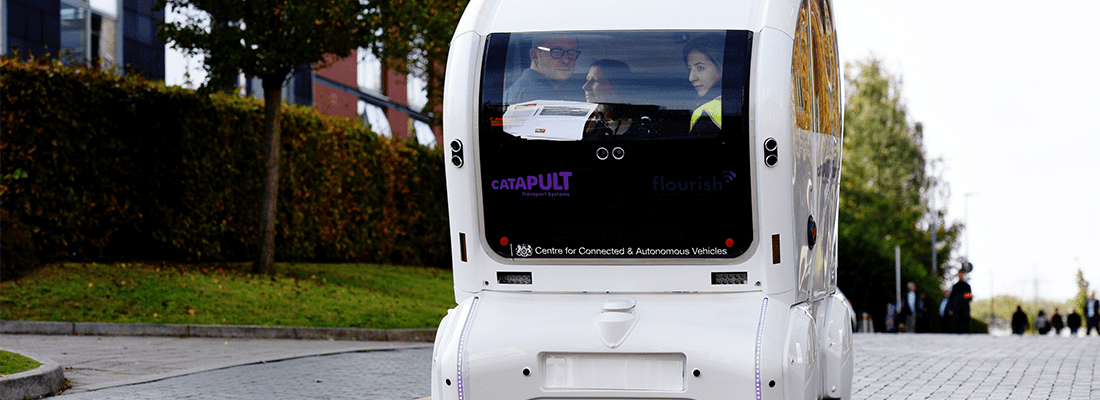
In 2017, the Government launched four Grand Challenges as part of the modern Industrial Strategy, including one on the Future of Mobility. This investment in self-driving technologies is a key element in boosting productivity in British businesses in this sector.
The market for self-driving vehicles in the UK is predicted to be worth £52bn by 2035, and it is believed the investment is worth making to maximise the UK’s global position in the industry.
One initiative that received Government backing is Flourish, a research and development project looking at how CAVs can help people less able to travel, which has just released its final findings.
“We’re on the cusp of one of the most profound changes ever to happen to our transport system, enabled by new technologies such as self-driving vehicles,” said Iain Forbes, head of the Centre for Connected and Autonomous Vehicles. “These changes could transform the lives of some disabled or older people who currently find it tough to use the transport system.”
“However, we won’t get there unless those designing the technology engage properly with a wide range of transport users. That is why Government is investing in projects such as FLOURISH, that bring technology companies together with transport users to help ensure our future transport system works for everyone.”
In a three-year initiative worth £5.5 million and co-funded by the UK government, Flourish has helped to advance the successful implementation of CAVs in the UK, by developing services and capabilities which maximise the benefits of driverless vehicles for users and transport authorities.
The project was a collaboration between small and medium companies and large businesses across multiple industries, universities, local authorities and the not-for-profit sector, to investigate how these vehicles might benefit older adults and those with mobility-related conditions.
Flourish adopted a user-centered approach to design and development, with the needs of older adults being the focus of their work. Several trials with older adults have been held over the past three years using simulated environments and self-driving pods, similar to cars.
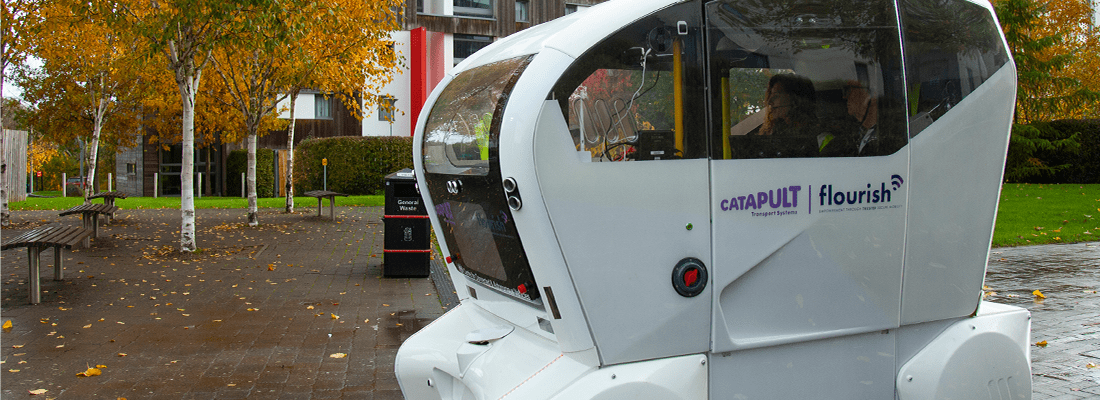
Mervyn Kohler, an Age UK spokesman, who has contributed to discussions about mobility and older people for the last 30 years, believes Flourish’s approach will be key to the positive impact self-driving cars have on older adults.
“There is obviously a connection between loneliness and mobility. If you are finding it difficult to get around or are experiencing poor health, either physical or mental, your quality of life is going to be lower,” says Mervyn.
“We’ve got to help people get out and about, and this points expressly to the idea of driverless cars. ”Flourish is important because it has particularly worked with older people to help develop the technology they would use to interact with a CAV. We’ve heard from older people: ‘I find it difficult to programme the computer with my bad arthritis and my poor eyesight and so on and so forth’.
”So, if we can provide them with a voice recognition way of controlling their journey, that is probably a good idea.
”These are all relevant points to the lives of older people and, by making sure we don’t overlook them, we’ll make the driverless car a much more accessible vehicle for older people.” One of the participants in the simulator and pod trials, Robin, says he cannot wait for self-driving cars to become a reality. The 76-year-old former BBC journalist from Bristol says: “It’s going to be quite awful when I can’t get in a car and go where I want to. ”It’s all very well using the bus, but your friends don’t necessarily live by a bus stop and, as you get older, you think ‘I don’t want to walk that far’.
”These pod things will give a whole new dimension for people of a certain age. So instead of looking forward to it with worry, I look forward to it and say ‘come on, I want them now. I’m 76 - I can’t wait forever’. ”Our lives will change amazingly, and I think this is a really good force for a better life.”
”Driverless cars will bring huge social inclusion benefits for older adults and those with mobility-related conditions,” says Tracey Poole, Flourish’s project manager and transport planning specialist at Atkins.
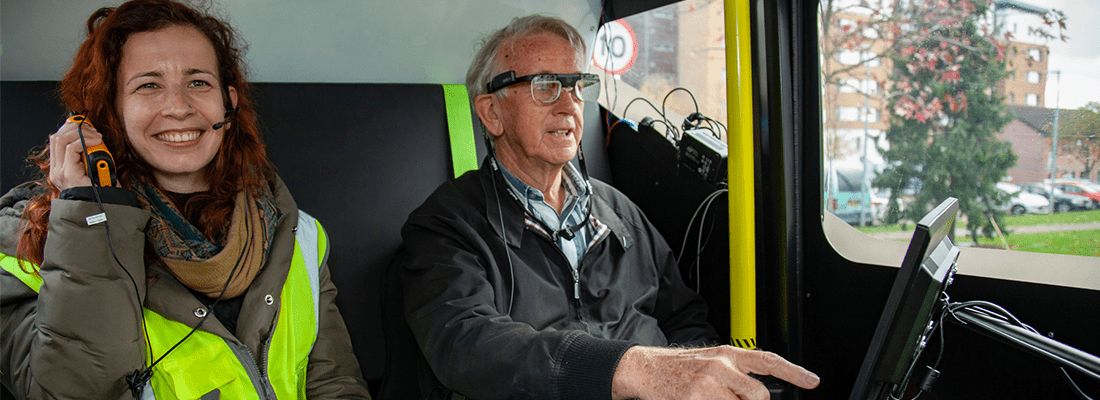
”We believe Flourish is the only project to focus on the impact of connected and autonomous vehicles on older adults. ”Furthermore, the project’s connectivity findings will also help the users of the future to make real-time journey decisions, responding to live information. ”Not only will these vehicles be more inclusive; they will also be safer, more efficient and more environmentally friendly.”
Although safety is one of the big prizes associated with the introduction of self-driving cars, with the vast majority of collisions caused by human error, concerns about their safety are common.
The Government is keen to understand the public’s view around CAVs and continues to survey public attitudes. It is also taking big steps towards establishing how our laws and regulations might need to change to support the safe use of self-driving cars, something the Law Commission of England & Wales and Scottish Law Commission are currently investigating.
Meanwhile, insurance isn’t as big a problem as it may first seem. Last year the Government created new insurance rules for self-driving cars in the Automated & Electric Vehicles Act.
The Act says the driver of an automated vehicle must get insurance that covers them when they are in control and when they hand control to their self-driving car. The insurer would pay compensation if the automated vehicle caused a collision, and then recover costs from whoever was responsible ? and that could include the vehicle maker.
There is still a way to go until self-driving cars will be fully introduced onto our roads. They will need to be proven to be safe, secure and reliable. However, with some of the nation’s brightest minds working alongside organisations such as Age UK, there is a compelling opportunity to build the technology around the needs of those who could benefit most from it.
